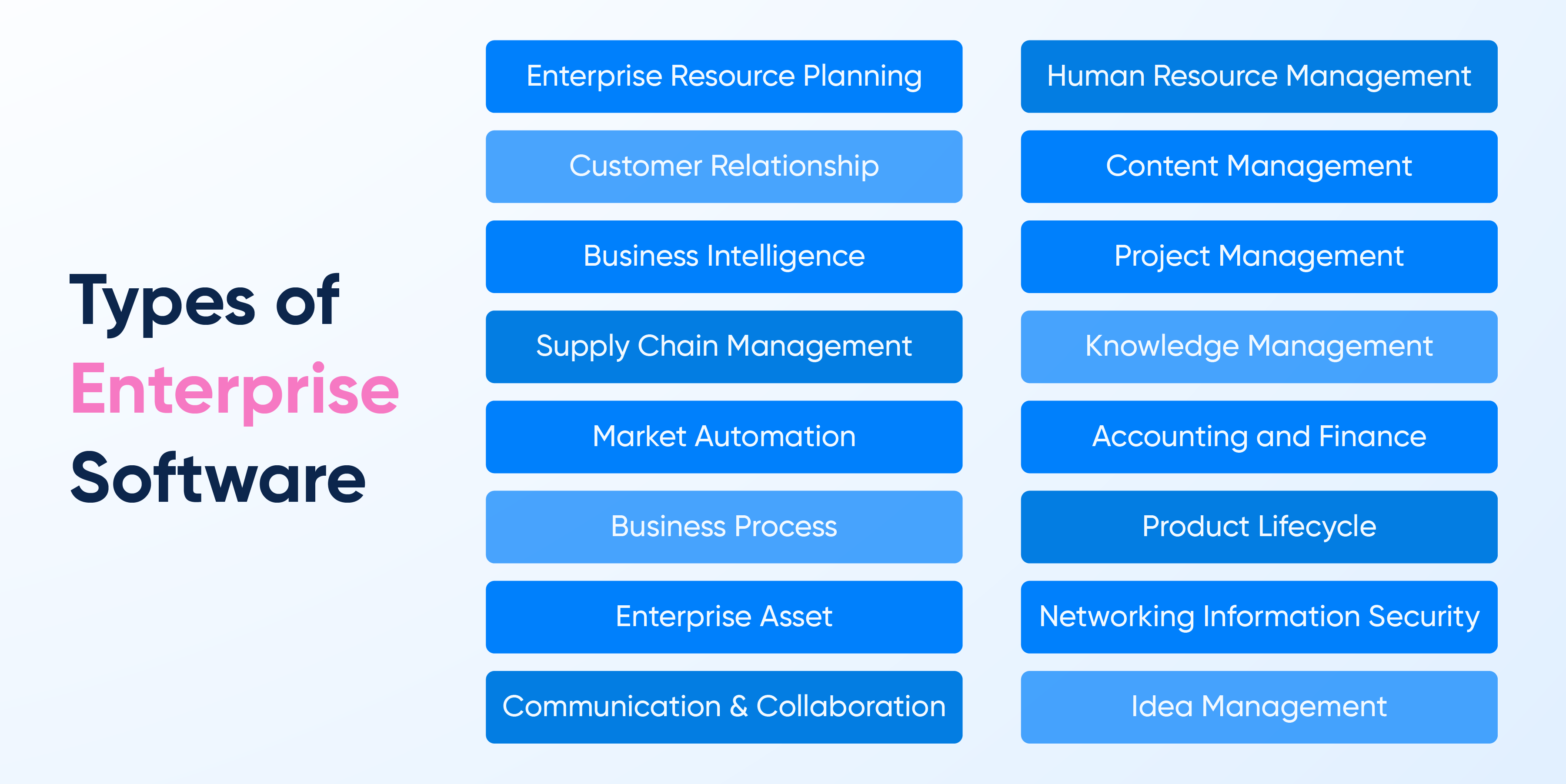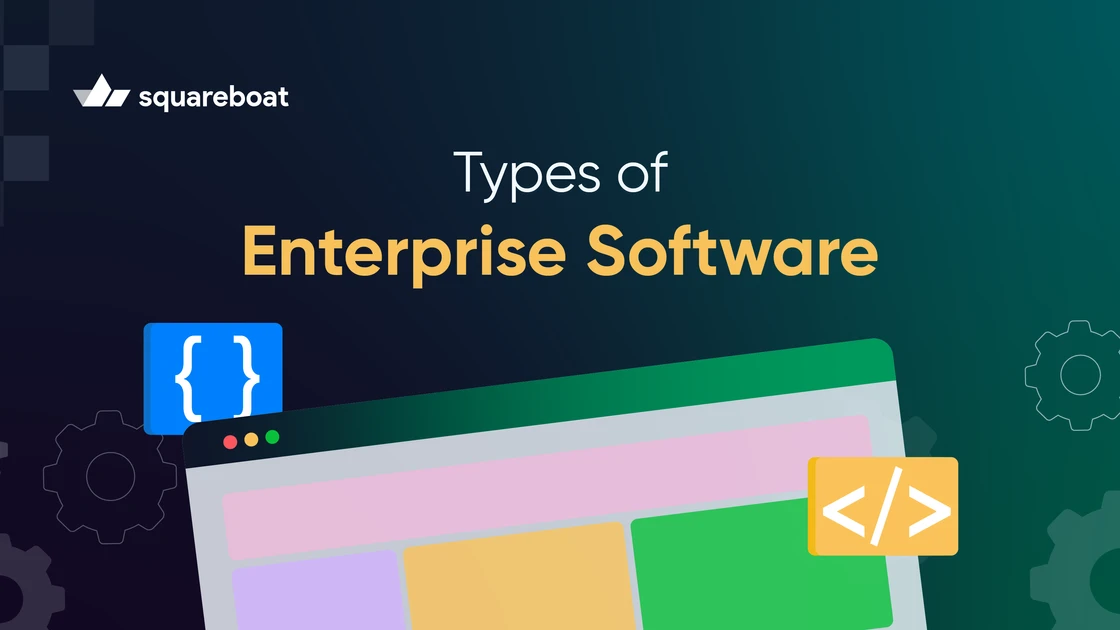Operating a business today that relies solely on manual processes becomes unsustainable in a surprisingly short time. Without the right software in place, managing customer relationships, coordinating internal functions, and maintaining real-time visibility quickly become slow and error-prone.
In fact, a recent Gartner survey revealed that 80% of executives believe automation can be applied to any business decision, highlighting how deeply integrated enterprise software is for modern businesses.
The bottom line? Enterprise software has become a strategic imperative and a synonym of an efficiency driver.
Considering its importance, let’s break down the key types of enterprise software.
What is Enterprise Software?
Enterprise software is a category of computer-based applications that are designed for use by organisations rather than for personal use by individual users. It is like the nervous system of your business, connecting all departments and ensuring that your organization operates in sync.
In this blog, we will discuss various types of enterprise software systems along with their importance and why several industries are increasingly turning to these systems. So, stay tuned till the end.
Why is Enterprise Software Important?
The importance of enterprise software lies in its role as a strategic engine that drives modern business practices in a digital-first economy. Given that every business has its unique set of requirements, it becomes crucial for them to employ the ideal types of enterprise software systems that can support their growth and help them expand their market reach.
Operational Efficiency through Automation
Enterprise software helps automate end-to-end processes, including data entry, payroll, inventory management, and customer service. This ensures process consistency across all departments, reducing human error and administrative overhead. The result? Teams can focus on other higher-value activities, such as planning business growth initiatives and increasing customer engagement.
Data-Driven Decision Making
By collecting and storing all essential information from various departments, enterprise software creates a unified source of truth that is accessible to all employees in the organisation. It also enables users to gain valuable insights from this information using innovative data tools. Leaders can make informed decisions based on tangible evidence rather than guesswork.
Adaptability and Scalability
Enterprise software helps organisations expand their businesses effortlessly, due to its capability to manage huge volumes of transactions and serve an increasing number of customers. Plus, it also offers companies the flexibility to adapt to evolving business needs quickly.
Improved Collaboration
These solutions offer simple-to-use platforms for communication, project management, and document sharing. This means that teams across multiple departments and different locations can work together efficiently and collaborate more effectively.
Cost Savings and Return on Investment
Procuring an enterprise software involves a heavy initial investment. However, this is quickly outweighed by the long-term benefits, such as reduced manual labour and a strong return on investment.
Types of Enterprise Software
When discussing types of enterprise software, each one is classified based on its core function and the specific business area it supports. Let’s explore one by one.

Enterprise Resource Planning (ERP) Software
ERP software offers a centralized platform that facilitates the management of key business processes. It collects information from multiple departments, including HR, finance, manufacturing, supply chain, sales, and procurement, and stores it in a unified data hub. This ensures that everyone within the organisation has real-time access to vital information whenever needed and can make informed decisions.
- Industry Applications: ERP systems are primarily used in various sectors, including manufacturing, retail, healthcare, finance, IT services, construction, and numerous other industries. These systems are customised according to the unique requirements of each sector.
Examples: Microsoft Dynamics 365, Oracle ERP Cloud, SAP Business One, Sage Intacct
Customer Relationship Management (CRM)
CRM software enables businesses to manage and improve interactions with their present and potential customers. These systems collect and store critical customer data, including contact details, purchase history, and communication logs.
By utilising this comprehensive set of information, companies gain a 360-degree view of individual customer needs, enabling them to offer more personalised service, prepare effective sales strategies, and ensure stronger customer retention.
- Industry Applications: CRM software is primarily used in various industries, including real estate, banking and financial services, retail, healthcare, e-commerce, and non-profit organizations. These sectors benefit from the CRM system’s ability to improve customer engagement.
Examples: HubSpot, Salesforce, Zoho CRM, Pipedrive
Business Intelligence (BI)
BI tools help organisations to make data-driven decisions. These tools are designed to gather and analyse data from numerous sources, such as databases, spreadsheets, emails, social media sites, and many more.
These tools are built to convert raw data, which may include both structured and unstructured data, into actionable insights. Companies can make well-informed decisions based on the insights.
- Industry Applications: Business Intelligence (BI) software is utilized in numerous industries, including finance, retail, e-commerce, healthcare, telecommunications, hospitality, government agencies, manufacturing, and education.
Examples: Microsoft Power BI, Tableau, Looker, Qlik Sense, Oracle Analytics Cloud, IBM Cognos Analytics
Supply Chain Management (SCM)
SCM software is utilised to streamline supply chain management. It automates routine tasks, from planning and procurement to logistics and delivery. It also enhances collaboration among multiple stakeholders involved in the entire supply chain process, including suppliers, manufacturers, warehouses, and distributors, enabling businesses to operate efficiently and smoothly.
- Industry Applications: SCM tools offer numerous benefits that address the operational challenges of multiple industries, including manufacturing, retail, healthcare, logistics and transportation, food and beverage, e-commerce, construction, and pharmaceuticals.
Examples: Infor SCM, Epicor SCM, Oracle NetSuite, FreightPOP
Human Resource Management (HRM)
HRM software, sometimes also known as HRMS (Human Resource Management System), is an enterprise application aimed to automate the core HR functions within an organisation, such as recruitment, employee onboarding, payroll management, attendance tracking, etc. These systems store employee data in a centralized database, and they provide a wide range of features that support businesses in managing their workforce effectively.
- Industry Applications: The industries that benefit from HRMS software include manufacturing, healthcare, retail, IT services, education, hospitality, finance and banking, construction, and many others. Organisations use these applications to track employee attendance, automate payroll calculations, and ensure compliance with labour laws.
- Examples: Workday, Oracle HCM Cloud, BambooHR, SAP SuccessFactors, Rippling
Content Management System (CMS)
A CMS is an enterprise software that simplifies the management of digital content, which may include text, images, videos, and other multimedia files. It provides a user-friendly interface to publish and manage websites, blogs, and different types of digital content.
- Industry Applications: Industries that rely on CMS to manage digital content include news organisations, magazines, e-commerce, education, healthcare, government, custom software development companies, hospitality, and tourism.
Examples: Drupal, Joomla, WordPress, HubSpot CMS, Microsoft SharePoint
Project Management Software
Project management software helps organisations to plan and manage their project workflows effectively. Agile teams widely use these tools to launch new projects, as they offer a structured approach along with a wide array of features to ensure the timely completion of projects within the budget.
- Industry Applications: These tools are utilized in various industries, including IT services, marketing and advertising, healthcare, manufacturing, consulting services, and government agencies.
Examples: Jira, Trello, Asana, Wrike, GitLab
Knowledge Management Software
Knowledge Management Software is an enterprise software designed to store and share information within and sometimes outside the organisation. Knowledge bases help employees within an organisation access relevant information, and externally, they enable customers to learn about a company’s specific products.
- Industry Applications: The industries that utilize knowledge base software for various purposes include customer support, healthcare, IT services, education and training, manufacturing, consulting services, law firms, government, and non-profit organizations.
- Examples: Document360, Confluence, MadCap Flare, Adobe FrameMaker, Adobe RoboHelp
Market Automation Software
The Marketing Automation Software comprises a series of digital tools that are used by businesses to manage their marketing activities effectively. These tools automate repetitive tasks that help companies support multi-channel marketing activities, attracting, engaging, and retaining customers.
- Industry Applications: Marketing Automation Software is used by industries such as retail, e-commerce, banking, SaaS-based companies, travel and hospitality, education, manufacturing, and non-profit organisations.
Examples: ActiveCampaign, HubSpot, Klaviyo, Omnisend
Accounting and Finance Software
The accounting and finance software is used by businesses to keep records of their transactions and expenses. It also helps with taxes as well as invoice generation, and it eliminates the hassles of manually entering data in complex spreadsheets by automatically organising all your financial transactions. It enables you to track your available funds and where your money is going, enabling you to make smarter decisions on expenditures and savings without the need to be a tech expert.
- Industry Applications: Some key industries include retail, construction, manufacturing, healthcare, real estate, agriculture, information technology (IT) services, non-profits, government, education, automotive, oil and gas, marketing, and financial services such as banking and insurance
Examples: QuickBooks, Xero, ZohoBooks, NetSuite, Vyapar App
Business Process Management (BPM)
BPM software is used to automate manual and repetitive tasks, from filling out forms to sending out emails, monitoring everyday business activities, identifying bottlenecks, and implementing necessary improvements over time. It is like a smart digital assistant that streamlines business workflow and ensures that everyone follows the best practices, leading to enhanced productivity and higher overall quality in business outcomes.
- Industry Applications: The industries that use BPM software include finance and banking, insurance, healthcare, manufacturing, retail, logistics, real estate, government, IT services, hospitality and many more.
Examples: Kissflow, Ninetex, Oracle BPM Suite, Monday.com, Appian, Process Maker
Product Lifecycle Management (PLM)
PLM software is responsible for managing the entire journey of a product, from initial idea and design phase to complete manufacturing, sale, and retirement. It keeps a record of all product-relevant details, such as designs, plans, materials, changes made along the way and customer feedback, in a central place. This makes it easier for designers and engineers to refine their products while also reducing errors and waste.
PLM system provides designers and engineers with access to the critical data they need in real-time. It simplifies project management by connecting CAD (Computer-Aided Design) information with a bill of materials and additional enterprise data sources, such as integration with an ERP system, and manages the product data throughout every stage of the product development lifecycle.
- Industry Applications: In general, manufacturing industries such as automobile, aeronautics, defence, electronics, heavy equipment, industrial machinery, life sciences, and medical devices primarily rely on PLM software.
Examples: Siemens Teamcenter, Dassault ENOVIA, SAP PLM, Oracle Agile PLM, PTC Windchill
Enterprise Asset Management (EAM)
EAM software helps organizations maintain digital records of their physical assets, including machines, vehicles, and equipment. It enables companies to locate their assets precisely, identify when they require maintenance, and determine when they need to be replaced. It is like a digital assistant that enables companies to make informed decisions about planning maintenance activities, avoid unexpected breakdowns, save money on repairs, and maximize the return on their investments. Its user-friendly design helps people with limited tech knowledge to use it and keep everything running smoothly.
- Industry Applications: The key sectors utilizing EAM software include oil and gas, mining, manufacturing, logistics, railways, aviation, automotive, electronics, food and beverages, pharmaceuticals, construction, healthcare, shipbuilding, and defense.
Examples: IBM Maximo, Oracle EAM, SAP EAM, IFS Cloud, eMaint
Networking and Information Security Software
The networking and information security software serves as a digital bodyguard, protecting a company’s valuable information and encrypting the pathways it traverses within the computer network. This software is essential for protecting all kinds of sensitive data against nefarious actors such as hackers, viruses, and any type of malicious programs, as well as online threats aiming to gain unauthorized access. It ensures that only authorized personnel have access to sensitive data and prevents any unauthorized tampering.
- Industry Applications: Major industries that rely on networking and information security software include banking, financial services, insurance, healthcare, retail, manufacturing, IT and telecommunications, government, education, utilities, mining, transportation, and energy sectors, such as oil and gas.
Examples: Antivirus solutions include Quick Heal, Norton 360, and McAfee Total Protection. Network Security tools include Wireshark, Splunk, and Nessus. Endpoint security tools include SentinelOne and CrowdStrike. Encryption tools such as VeraCrypt, NordLocker, KeePass. Information security tools such as Splunk Enterprise Security and IBM QRadar.
Communication and Collaboration Software
Communication and collaboration software comprises a series of digital tools designed to facilitate seamless interaction and teamwork among individuals, regardless of their physical location. This software has various kinds of features, such as instant messaging, audio and video calls, document sharing (for multiple people to edit documents at a time), and shared calendars that keep everyone informed about meetings as well as deadlines. All these features together play a pivotal role in keeping team members connected, regardless of their physical location, so that they can share information effortlessly and complete tasks efficiently.
- Industry Applications: A wide range of industries, including banking and financial services, IT sector, telecommunications, manufacturing, retail and consumer goods, healthcare, travel and transportation, education, government, utilities and resources, and professional services.
Examples: Microsoft 365, Google Workspace, Zoom, Slack, OnlyOffice, Zoho Workspace
Idea Management Software
Idea management software, also known as ideation software, enables organizations to collect ideas from employees (and sometimes customers) and store them in a centralized location in an organized manner. It also allows teams to vote on the best ideas, which are then further evaluated and discussed to determine whether they are worth pursuing and developing into real projects. When ideas get lost in meetings, sticky notes, or emails, this software provides a dedicated platform where everyone can share their suggestions and creative ideas. Ultimately, companies can utilise this software to tap into the creative potential of their staff and build a culture that empowers everyone to contribute to new improvements.
- Industry Applications: The largest adopters of idea management software are the IT sector, manufacturing, financial services, healthcare, and education. The IT industry leads in this segment due to rapid market changes and a constant need for new solutions, while healthcare is also the fastest-growing sector adopting ideation software, driven by the need for a more innovative approach to patient care.
Examples: Brightidea, HYPE, IdeaScale, Miro, Ideanote
Conclusion
Today, running a business is all about working smart and following the right approach. And that’s a primary reason why organizations are increasingly adopting this software to simplify their complex business operations. These tools enable teams from multiple departments to collaborate and share information easily, ensuring the timely completion of projects. Each enterprise software is built to address different business needs as per its unique technical capabilities and features.
By strategically utilising the right types of enterprise software systems, companies can automate manual and repetitive tasks, reduce the likelihood of unintended errors, and maximise productivity.


